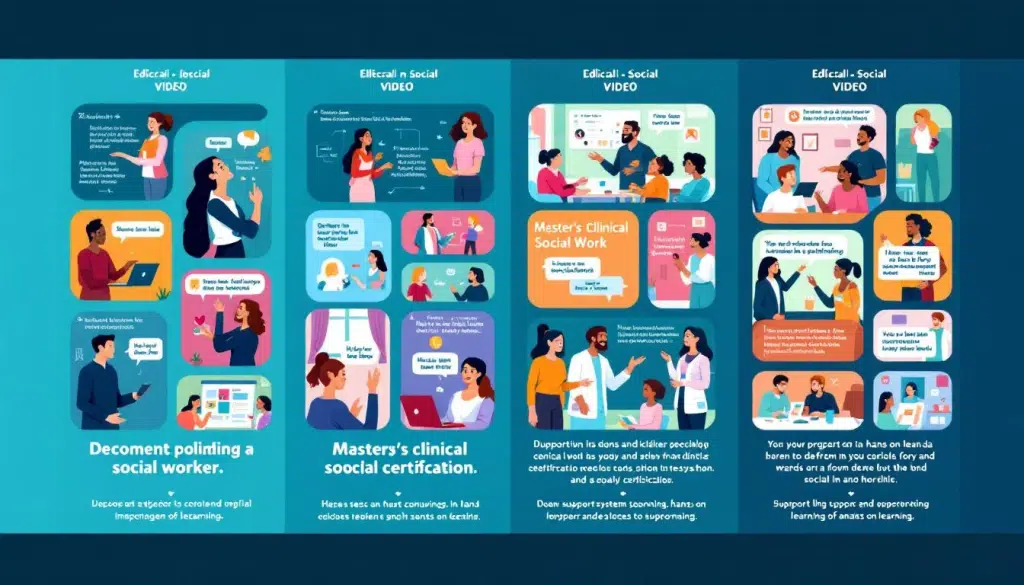Thinking about how to become a social worker? First, you’ll need a Bachelor’s Degree in Social Work. If you aim to provide clinical services, pursuing a Master’s Degree is the next step. This article will guide you through the entire process, from education and licensing to exploring different career opportunities in the field.

Social work is a practice-based profession that focuses on promoting social change, development, and community empowerment. As social workers, we address a myriad of challenges that individuals and communities face, including mental health conditions, substance use, homelessness, joblessness, and income inequality. We provide the support and resources necessary to help people navigate these complex issues, as guided by the importance of social policy in social work practice.
Licensed clinical social workers (LCSWs) play a crucial role in providing mental health services and resources. We assist individuals, families, and groups in overcoming everyday life challenges. Whether finding stable housing for a family, supporting someone’s addiction recovery, or providing therapy for mental health issues, social workers foster resilience and well-being.
We work in a variety of settings, including child welfare agencies, schools, and healthcare facilities. We often collaborate with other professionals to provide vulnerable populations, including diverse populations, with essential services and support through community organizations. The positive impact is profound, and the fulfillment from helping others is unmatched.

Becoming a social worker requires a significant investment of time and effort, typically taking between 4 to 8 years depending on the educational pathway chosen. The journey begins with obtaining a Bachelor’s Degree in Social Work (BSW), which serves as the foundational degree for entry-level positions.
Program accreditation is crucial as it ensures that the curriculum and training of social work degrees meet established standards, and the program accredited by the council. This accreditation guarantees that the education you receive will be of high quality and recognized by licensing boards and employers.
For those looking to advance their careers and specialize further, pursuing a Master’s Degree in Social Work (MSW) and further education is the next step. Research specific state licensure requirements to understand the implications for pursuing an MSW.
A Bachelor of Social Work (BSW) is typically required to become a social worker, allowing access to entry-level positions in social services. This undergraduate degree provides a solid foundation in social work principles and practices, preparing students to assist individuals, families, and communities in various settings, even with just a bachelor’s degree.
BSW programs generally include coursework in human behavior, social welfare policy, and ethics. These courses equip students with the knowledge and skills to address a wide range of social issues effectively. Additionally, students often participate in field placements to gain hands-on experience in real-world social work education settings.
A BSW degree typically takes four years to complete and is a worthwhile investment. Graduates can start making a difference in roles such as case managers, child welfare workers, and community outreach coordinators.
A Master’s msw degree in Social Work (MSW) opens up career opportunities and eligibility for certain social work licenses. An MSW is necessary to practice clinically as a social worker, allowing professionals to provide therapy and counseling services to clients.
Options for pursuing an MSW include on-campus and online programs as well as a graduate program. The MSW curriculum usually encompasses various components, including:
MSW students also undertake a significant field practicum to gain hands-on experience in clinical training and clinical practice. This practicum is crucial for developing the skills needed to provide effective and compassionate care to clients in various settings, especially in treatment programs and msw programs.
To become a licensed social worker, individuals must graduate from a CSWE-accredited program. This accreditation ensures that the education provided meets the standards necessary for professional practice. The minimum educational requirement to take the LCSW licensure exam is a master’s degree in social work from an accredited program, which is often pursued by those aiming to become a certified social worker.
The licensing process involves passing the ASWB Social Work Licensing Examination, which is developed at a national level by the Association of Social Work Boards (ASWB). This exam measures the competencies required for entry-level practice and is a crucial step in becoming a licensed social worker and obtaining professional licensing.
Typically, around 3000 supervised practice hours are required after obtaining an MSW for LCSW licensure. These supervised hours provide invaluable experience and ensure that candidates are well-prepared for supervised clinical experience in supervised clinical social work practice.
To become a Licensed Master Social Worker (LMSW), individuals must complete a master’s degree in social work. This certification is available in states like Michigan and requires passing the ASWB Master’s Level Examination. The exam is computer-based, pass/fail, and consists of about 170 multiple-choice questions.
Applicants must submit a licensure application and pay a fee of $294 to qualify for the LMSW exam. It’s important to note that in some states, like New York, there is no reciprocity for LMSW licensure.
Licensed Master Social Workers must also complete continuing education requirements for license renewal. For instance, in New York, LMSWs must complete 36 hours of approved continuing education every three years.
To become a Licensed Clinical Social Worker (LCSW), candidates must:
LCSW candidates should frequently check their specific state licensure requirements, as these can vary significantly. After licensure, LCSWs can specialize further and may hold certifications in areas such as child welfare, addiction, or mental health.

Social work includes various specializations to meet diverse community needs and enhance professional skills. School social workers, for example, support students’ social, emotional, and behavioral well-being within the school system, ensuring they have a conducive learning environment.
Healthcare social workers focus on personal and social factors affecting patient health, providing essential support in healthcare settings. They play a critical role in helping patients navigate the healthcare system and access necessary resources.
Substance abuse social workers assist individuals with addiction through substance abuse counseling, treatment program access, and family social workers support. Similarly, child welfare social workers ensure the safety and well-being of children by investigating reports of child abuse and connecting families with resources.
Mental health social workers provide therapy and support groups for individuals facing mental health challenges, mental illness, and behavioral challenges.

Social workers can pursue various career paths, including roles in medical, child welfare, school systems, and criminal justice. In New York, for example, social workers can find employment opportunities in sectors such as healthcare, education, and private practice.
Common employment settings for social workers include:
These roles often involve collaborating with multidisciplinary teams to provide comprehensive care and support.
Factors influencing the career paths chosen by social workers include their passions, interests, and skills. Many social workers also engage in advocacy to influence social policies and improve community resources.
To maintain a social worker license, continuing education units and educational requirements are required as per state requirements. Typically, 20-40 hours of continuing education are necessary for license renewal.
Social workers can pursue a Doctorate of Social Work (DSW) or a Ph.D. in social work to continue their education. These advanced degrees open up further career opportunities and enhance professional standing.
Professional organizations like the National Association of Social Workers (NASW) offer credentials to enhance a social worker’s education and professional standing. These credentials are valuable for advancing knowledge and demonstrating expertise in the field.
Before sitting for the LMSW exam, candidates must submit an application for licensure and pay a $294 fee. The cost of the LCSW exam is $260. Social work boards typically receive official scores within 14 days after the exam.
The ASWB examination lasts four hours and includes 170 questions. It measures entry-level practice competencies, preparing candidates for the advanced generalist exam and professional practice.
The ASWB Examination Guidebook provides: key areas of focus by section
Candidates should arrive at the test center 30 minutes early to be ready for the exam.

The median annual earnings for social workers were reported to be $61,330 in 2024. Licensed Clinical Social Workers (LCSWs) earn a median annual wage of $78,100, while Licensed Master Social Workers (LMSWs) earn around $57,870. Factors affecting the earning potential of social workers include the state they work in and the industry they are employed within.
Employment for social workers is expected to increase by 7% from 2023 to 2033, which is faster than the average for all jobs. More than 67,000 new job openings for social workers in the U.S. are projected from 2023 to 2033. This positive job outlook makes social work a stable and rewarding career choice.
In summary, becoming a social worker involves a dedicated journey through education, licensure, and continuous professional development. The role of social workers is vital in addressing societal challenges and providing support to those in need.
The educational pathways, from obtaining a BSW to an MSW, provide the foundational knowledge and practical skills necessary for effective practice. Licensing requirements ensure that social workers are well-prepared and qualified to deliver high-quality services.
With various specializations and career opportunities available, social work offers a fulfilling and impactful career. The positive job outlook and potential for continuous growth make it an attractive profession for those passionate about making a difference.
To become a licensed social worker, the minimum educational requirement is a Bachelor’s Degree in Social Work (BSW), while a Master’s Degree in Social Work (MSW) is necessary for clinical practice.
Typically, it takes between 4 to 8 years to become a social worker, depending on the chosen educational path. This includes obtaining a bachelor’s degree followed by a master’s degree in social work.
Social workers are typically required to complete 20-40 hours of continuing education for license renewal, varying by state; for instance, Licensed Master Social Workers (LMSW) in New York need to fulfill 36 hours every three years. This ensures that social workers remain knowledgeable and competent in their field.
A Licensed Clinical Social Worker (LCSW) plays a crucial role in providing therapy and counseling, often focusing on specialized areas like child welfare, addiction, or mental health. This position requires at least three years of supervised experience in diagnosis and psychotherapy. Their expertise is essential for addressing complex emotional and behavioral challenges.
The job outlook for social workers is favorable, with a projected employment growth of 7% from 2023 to 2033, creating over 67,000 new job opportunities in the next decade. This indicates a strong demand for professionals in the field.